Jack Cole -- creator of the first Theatrical Jazz
Dance technique.
Born in New Brunswick, NJ as John Ewing
Richter, Jack Cole will always be remembered as the prime innovator
of the theatrical jazz dance heritage. Early on he decided to pursue dance
with the Denishawn Dance Company led by Ruth St. Denis and Ted Shawn.
Cole also performed with Doris Humphrey and Charles Weidman, but eventually
left the modern dance world for commercial dance career in niteclubs,
performing with Alice Dudley, Anna Austin and Florence Lessing.
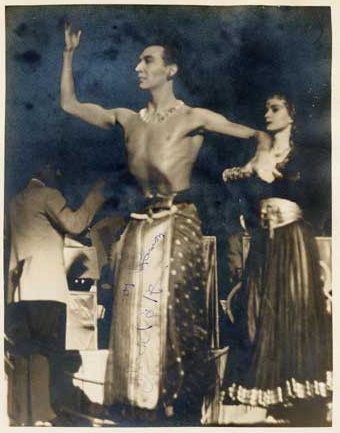
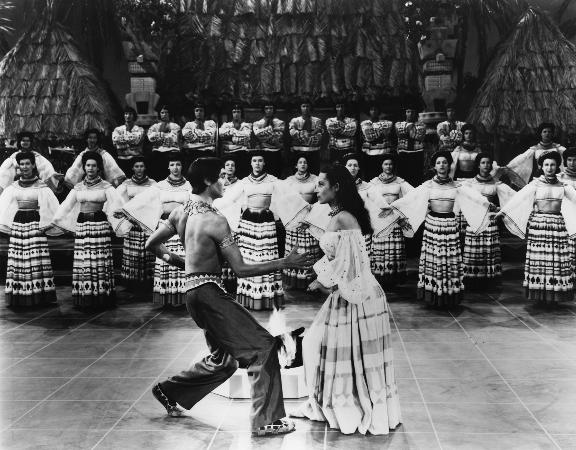
Jack Cole with Florence Lessing in Moon Over Miami
Highly disciplined and dedicated to absolute perfection Cole was known for
being a tyrannical task master. Throughout his career, Cole viewed
information, thought and knowledge as necessary support systems
to his life as a dancer and choreographer, not merely as avenues
to the period, style and local color preparation for each
new show. He made extraordinary demands on his dancers. He
was reputed to have used vulgar language and even
physical violence in his quest for artistic excellence.
In a 1968 interview with Dance Magazine
he confided, "Sometimes you have to slap them. Sometimes you
have to kiss them. It isn't like painting or writing or something that
can be done in solitude. The trouble with choreography is
you have to get the person out of the way before you can bring
out the dancer." But the mastery of technique wasn't
everything. Cole also demanded that his dancers be in touch
with the emotions and attitudes of the movement. In
the same interview Cole says:
"In the theatre you want to see real people doing real
things, expressing valid emotions in an artistic, meaningful way, disclosing bits of insight
that will transfix you and make you understand something about
life, and about yourself . . . I just try to touch the dancer at
the center of his emotion. I try to remind him of what he is -- a dancer,
and actor, a real person. If you're ashamed of this or that emotion, you
can't dance. You yourself may not behave a certain way as a person, but when
you dance you must bring real emotion to whatever you're doing. Isn't that
what dancing is about --emotion, life -- and not just patterns in the air?"
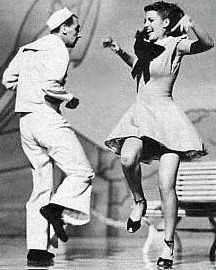 Cole and Rita Hayworth
(1945) Cole and Rita Hayworth
(1945)
The Cole Style
Jack Cole developed an entirely personal mode of jazz-ethnic-ballet
that prevails as the dominant look of and technique for dancing in today's
musicals, films, niteclub revues, television commercials and
videos. His highly individual style emphasized isolations, angled foot placements, quick directional changes, and long knee slides.
Cole's mastery of India's bharata natyam greatly influenced his style. He set authentic Indian dance to contemporary jazz music (like
Raymond Scott's "Dinner Music for a Pack of Hungry Animals") and combined the movements
with African-American and other ethnic dance characteristics. This
was the first formation of a serviceable theatrical jazz dance style.
It became known by many as the "Cole Style" but Cole called it "urban folk
dance."
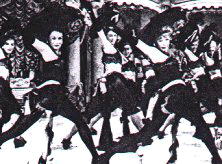 The Merry Widow
(1952) The Merry Widow
(1952)
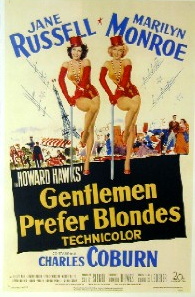
Cole is credited with choreographing the Broadway shows Magdalena, Carnival
in Flanders, Kismet, A Funny Thing Happened On The Way To The Forum, Kean,
Donneybrook!, Jamaica and Man Of La Mancha. His filmwork includes Eadie Was a Lady, Moon Over Miami, On the Riviera, Cover Girl, The Merry Widow, Gentlemen Prefer Blondes, There's No Business Like Show Business, The I Don't Care Girl, Thrill Of Brazil, Down To Earth, Kismet, Les Girls, Some Like It Hot, and many others uncredited.
|